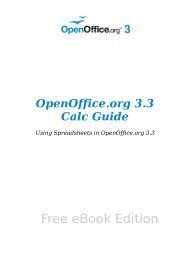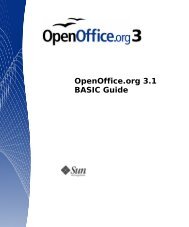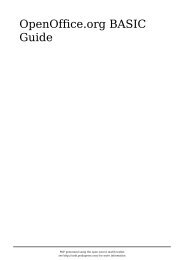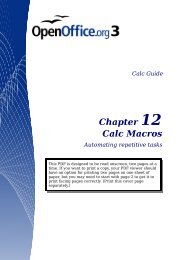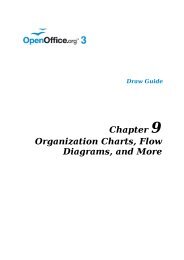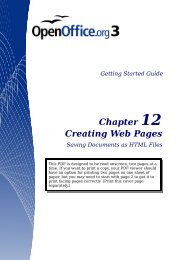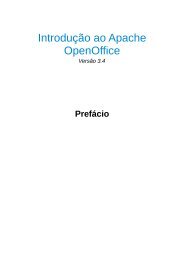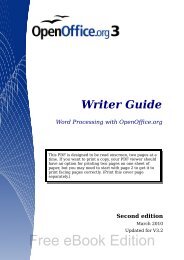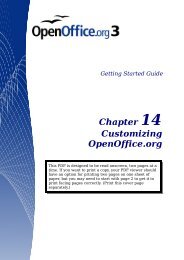OpenOffice.org BASIC Guide - OpenOffice.org wiki
OpenOffice.org BASIC Guide - OpenOffice.org wiki
OpenOffice.org BASIC Guide - OpenOffice.org wiki
Create successful ePaper yourself
Turn your PDF publications into a flip-book with our unique Google optimized e-Paper software.
Passing Parameters<br />
Procedures and Functions<br />
Functions and procedures can receive one or more parameters. Essential parameters must be enclosed in<br />
parentheses after the function or procedure names. The following example defines a procedure that expects an<br />
integer value A and a string B as parameters.<br />
Sub Test (A As Integer, B As String)<br />
' ...<br />
End Sub<br />
Parameters are normally passed by Reference in <strong>OpenOffice</strong>.<strong>org</strong> Basic. Changes made to the variables are<br />
retained when the procedure or function is exited:<br />
Sub Test<br />
Dim A As Integer<br />
A = 10<br />
ChangeValue(A)<br />
' The parameter A now has the value 20<br />
End Sub<br />
Sub ChangeValue(TheValue As Integer)<br />
TheValue = 20<br />
End Sub<br />
In this example, the value A that is defined in the Test function is passed as a parameter to the ChangeValue<br />
function. The value is then changed to 20 and passed to TheValue, which is retained when the function is exited.<br />
You can also pass a parameter as a value if you do not want subsequent changes to the parameter to affect the<br />
value that is originally passed. To specify that a parameter is to be passed as a value, ensure that the ByVal<br />
keyword precedes the variable declaration in the function header.<br />
In the preceding example, if we replace the ChangeValue function then the superordinate variable A remains<br />
unaffected by this change. After the call for the ChangeValue function, variable A retains the value 10.<br />
Sub ChangeValue(ByVal TheValue As Integer)<br />
TheValue = 20<br />
End Sub<br />
Note – VBA : The method for passing parameters to procedures and functions in <strong>OpenOffice</strong>.<strong>org</strong> Basic is<br />
virtually identical to that in VBA. By default, the parameters are passed by reference. To pass parameters as<br />
values, use the ByVal keyword. In VBA, you can also use the keyword ByRef to force a parameter to be passed<br />
by reference. <strong>OpenOffice</strong>.<strong>org</strong> Basic recognizes but ignores this keyword, because this is already the default<br />
procedure in <strong>OpenOffice</strong>.<strong>org</strong> Basic.<br />
Optional Parameters<br />
Functions and procedures can only be called up if all the necessary parameters are passed during the call.<br />
<strong>OpenOffice</strong>.<strong>org</strong> Basic lets you define parameters as optional, that is, if the corresponding values are not included<br />
in a call, <strong>OpenOffice</strong>.<strong>org</strong> Basic passes an empty parameter. In the following example the A parameter is<br />
obligatory, whereas the B parameter is optional.<br />
Sub Test(A As Integer, Optional B As Integer)<br />
' ...<br />
End Sub<br />
The IsMissing function checks whether a parameter has been passed or is left out.<br />
Sub Test(A As Integer, Optional B As Integer)<br />
Dim B_Local As Integer<br />
' Check whether B parameter is actually present<br />
If Not IsMissing (B) Then<br />
B_Local = B ' B parameter present<br />
Else<br />
B_Local = 0 ' B parameter missing -> default value 0<br />
End If<br />
' ... Start the actual function<br />
End Sub<br />
Chapter 2 · The Language of <strong>OpenOffice</strong>.<strong>org</strong> <strong>BASIC</strong> 29



